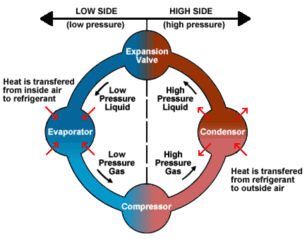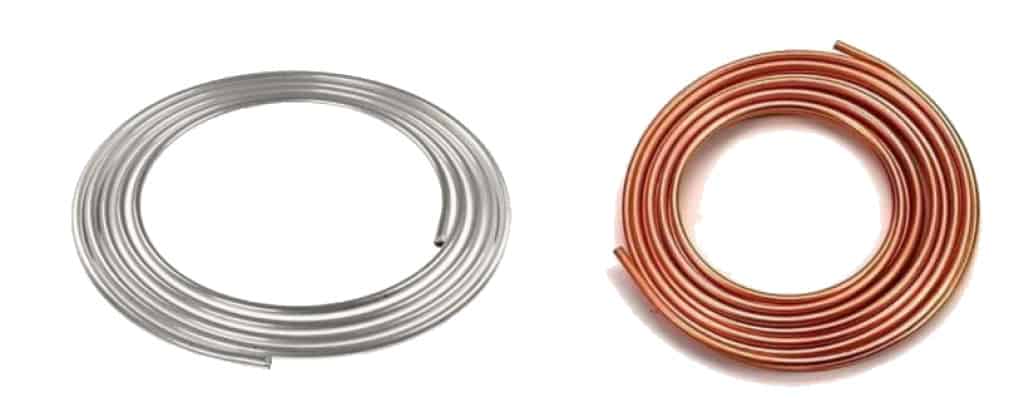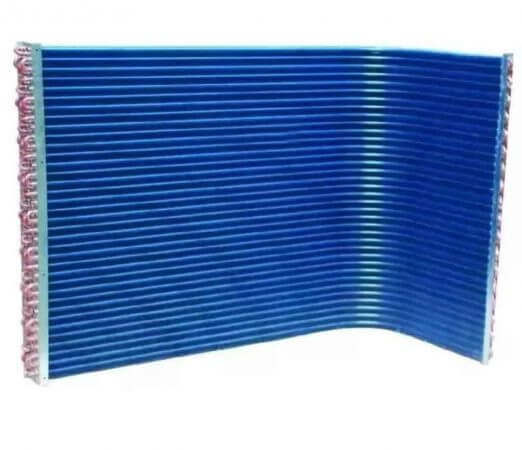One of the confusion that bothers us is the Copper Coil Vs Aluminium Coil when we are shopping for an air conditioner or a refrigerator. Many people do not know the difference.
In this article, we will give you a broad overview of copper coil vs aluminium coil, and after that, you can easily decide which one is the best for you.
We consider so many things like the tonnage of an AC, power consumption, number of features, and aesthetics while buying an air conditioner.
But we mostly ignore one of the most important aspects of an air conditioner, the condenser coil.
There are two types of condenser coils available in an AC. One is an aluminum coil, and the other is a copper coil.
Both have their advantages and disadvantages, and we are going to discuss those in this article.
But before that, let’s explore the importance of the condenser coil in a refrigeration cycle.
Importance Of Condenser Coil: Aluminium Condenser vs Copper Condenser
A refrigerant is one of the basic elements of an air conditioner or a refrigerator. It flows through different parts of a refrigeration cycle and, during the whole process, changes the state from gas to liquid, and changes the temperature and pressure.
While the refrigerant flows through the system, it absorbs heat from the room and dissipates it into the atmosphere. The whole process of the refrigeration cycle is called HVAC ( Heating Ventilation And Air Conditioning)
There are four major processes involved in a typical refrigeration cycle as shown below.

1. Compression
The hot and low-pressure refrigerant gas from the evaporator is converted into high-pressure and high-temperature liquid in the compressor. The compressor can use a fixed-speed motor or a variable-speed motor to elevate the pressure and temperature.
2. Condensation
High-pressure hot liquid refrigerants from the compressor are passed through the condensation process, and while passing through condensation coils, it dissipates heat into the surrounding atmosphere.
Often a fan is used for forced condensation. The coils are typically made of either copper or aluminum.
3. Expansion
A set of expansion valves reduces the pressure in the refrigerant liquid before it goes into evaporation.
4. Evaporation
During the evaporation process, the low-pressure, low-temperature refrigerant liquid absorbs the heat from the room and converts itself into a low-pressure gas.
The cycle then continues like that.
So, you may notice that the condenser coil plays an important role in dissipating heat into the atmosphere. If the condenser does not dissipate heat, the refrigeration cycle won’t work at all.
This principle works in all types of machines based on HVAC systems. Only the system size changes.
Therefore, the different types of coils used in them affect the efficiency of the HVAC system. The size of the coils, the materials used to make them, and the ease of cleaning and maintenance play a huge role in the functioning of HVAC systems.
Historical Information About AC Condenser: Copper Coil vs Aluminum Coil
In the past, the most popular option for making the condenser coil was copper. For many years various coils of the HVAC system were made only from copper.
Copper was a natural choice due to its various benefits. However, due to this, designing the air conditioner used to be expensive, and not everyone could buy it.
Around 1970, General Electric took a step that proved to be a ‘game-changer for the air conditioning industry. They started using aluminum to make coils.
The cost of using aluminum was much lower than that of copper, which significantly reduced the total cost of luxury equipment such as air conditioners and brought consumers into the affordability range.
Since then, a new debate has arisen about which is better for making coils.
Difference between Copper And Aluminium AC
We will figure out the differences between copper coil and aluminum coil based on some key parameters as explained below.

Heat Transfer Characteristics
Without a second thought, copper is the best metal for heat transfer due to its high conductive properties.
A condenser coil made from copper can dissipate heat more efficiently and quickly. So your AC or refrigerator will cool your room better and will also save more energy.
If you care about cooling efficiency, you should buy an air conditioner with a copper condenser coil. Aluminum coils can not match the cooling efficiency of a copper coil.
Flexibility
If you notice carefully, condenser coils are bent in ” U” shapes, and there are multiple turns of tubes in a single condenser coil.
Due to this shape and multiple turns, refrigerants can travel more distance and get more time to dissipate heat.
To create such bends, we need materials to be more ductile. That means, if you bend the metal, it should not break up to a certain extent.
The ductility of copper is better than aluminum. You can easily bend a copper tube with bare hands without breaking it, But for aluminum, there is always a chance of breaking.
The only concern for the copper tube is the weight. The density of copper is higher than aluminum. So for the same design, a copper coil will be heavier than an aluminum coil. Since copper is heavier, it will cost you more.
Strength and reliability
Copper is much easier to repair than aluminum. Many times, aluminum coils ask for changes if they are damaged. Copper coils are stronger than aluminum, so they are also durable.
Ease of Maintenance and repair
Condenser coils are exposed to the environment, unlike other refrigeration systems assembled under a sealed system.
Since condenser coils are exposed, you can expect more damage too. If your aluminum coil is damaged, you often need to replace the complete coil. That would cost a good amount of money.
However, many joining methods like soldering or brazing work to fix the leakage without really replacing the whole coil in copper. That drastically reduces the repair cost.
Corrosion
Corrosion plays a vital role in determining the life of an air conditioner. Rusts damage the coil, disrupting the heat transfer process and resulting in leakage. Therefore, we must protect the condenser coil from rust damage.
Corrosion is a formidable problem for people living in humid climates and on the seaside because such areas have high moisture content.
Rust in copper is in the form of ‘Formicide Rust,’ but we can control this type of rust to a great extent by regularly cleaning the coil and maintaining caution.
The major problem that comes with aluminum coils is Galvanic Rust. Galvanic corrosion occurs when aluminum coils are joined to a copper tube. Galvanic corrosion occurs when two different metals, such as copper and aluminum, are exposed to moisture in the presence of an electrolyte.
Due to this rust, a non-conducting layer is formed over the coil, which reduces the heat exchange capacity of the Aluminium Condenser.
Due to the expansion of many modern technologies nowadays, there has been a surge in corrosion-resistant technology in the market, which protects the Aluminium Condenser and Copper Condenser against rust and helps to extend the life of AC.
Summary Of Copper Coil Vs Aluminium Coil
| Characteristics | Copper Coil | Aluminum |
|---|---|---|
| Cooling efficiency | Better | Less than copper |
| Design flexibility | Good | Poor, due to less ductility |
| Weight of condenser | More than aluminum | Aluminum coil weights less than copper coils |
| Durability | More tough and durable | Not so durable |
| Reliability | More reliable | Less reliable |
| Maintenance | Easy to maintain | Tough to maintain |
| Repairs | Easy repairs | Need to replace the whole coil |
| Cost | Very High | Low |
New Technologies Used In Condenser Coils
Each type of metal has its advantages and disadvantages, which play an important role in being an appropriate choice for making condenser coils.
And when we look for an answer to which type of coil is the best, we should also test some modern technology to perform better.
Blue Fin Condensers
Blue Fin Condenser or Blue coated condenser has a special anti-corrosive coating to protect condensers from the accumulation of salt, acid, and water droplets.

Most reputed brands like Voltas, Panasonic, and Electrolux use this technology in their premium product ranges. This type of coating is useful if you live in coastal areas like Mumbai, Chennai, or Kolkata, where the moisture content in the air is more.
Micro Channel
Most aluminum coils are micro-channel condenser coils nowadays. Many are a group of flat tubes and are made of aluminum. They contain small channels (microchannels) through which refrigerants flow.
In this setup, flat tube aluminum fins are located between the two refrigerant manifolds. Because there is no joint of two different metals in this setup, they are free from galvanic corrosion.

Due to these technologies, not only do people in coastal areas get a suitable option, but it also increases the thermal performance of the Aluminium Condenser by increasing the surface area. Samsung makes full use of this technology in many of its models.
Extra Heat Exchanger
Many air conditioners are coming with an extra heat exchanger nowadays. Those are usually water-cooled.
This kind of design is inspired by the automotive industry, where the radiator uses liquid cooling technology to keep the engine cool.
Water cooling is more effective than air cooling. Therefore, with this additional heat exchanger, the machine’s ability to throw out hot air is greatly increased compared to just air-cooling. Thus, ACs are also able to operate efficiently at very high ambient temperatures.
Conclusion: Copper Coil vs Aluminium Coil
Well, we might have now realized that both copper and aluminum coil have their advantages and disadvantages. Ultimately, it all depends on your requirements to decide which is the best.
I would always suggest you go for an AC with the copper coils only as those are better cooling efficient, easy to repair, and can save your power bills.
But the initial investment will be more. So the choice is yours whether to buy an aluminum coil AC or copper coil AC.